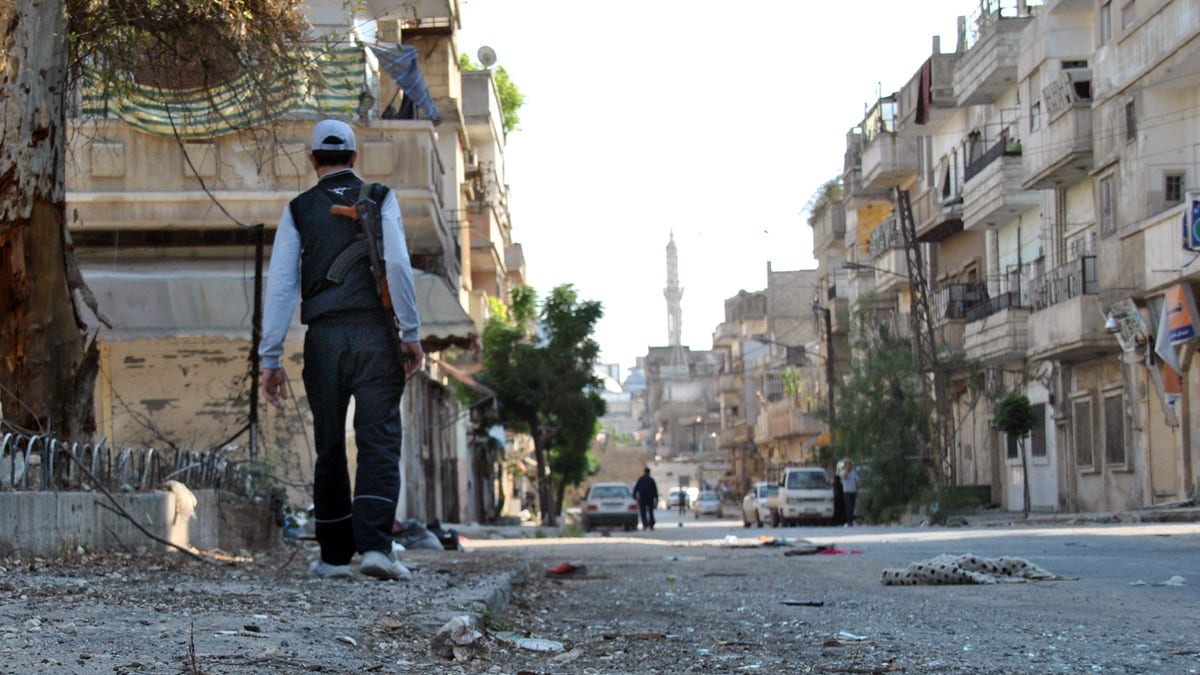
May 15, 2012: In this photo, a Syrian rebel walks in Khaldiyeh neighborhood in Homs province, central Syria.
BEIRUT – A team of international observers was evacuated from a tense town in northern Syria on Wednesday, one day after a roadside bomb hit their convoy and left them stranded overnight with rebel forces, a U.N. spokesman said.
The team's vehicles were struck by the blast Tuesday during a mission in Khan Sheikhoun, which has witnessed anti-government protests since an uprising against President Bashar Assad's regime began in March last year. None of the observers was wounded, but they had to spend the night with rebels in the area.
Tuesday's attack, which came minutes after witnesses said regime forces gunned down mourners at a funeral procession nearby, dealt a fresh blow to international envoy Kofi Annan's peace plan and the U.N. effort to monitor compliance with a troubled cease-fire agreement. The deal already has been tested by relentless violence from both sides, and fears about the observers' safety could raise doubts about its effectiveness.
Ahmad Fawzi, a spokesman for Annan, said the observers were "reported to be uninjured and in good health."
Syria-based U.N. spokesman Hassan Seklawi said U.N. members picked up the team around noon Wednesday.
"They left in one convoy in the direction of Hama," Seklawi said referring to a central city south of Khan Sheikhoun.
Even as violence grips the nation, Assad told a Russian state news channel that his country supports his reform agenda.
He pointed to recent parliamentary elections, saying Syrians "up to this time support the course of reform."
The government has praised the May 7 vote as a milestone in promised political reforms. But the opposition boycotted the polls and said they were orchestrated by the regime to strengthen Assad's grip on power.
The interview was to be broadcast on state news channel Rossiya-24 later Wednesday, but some excerpts were released in advance.
Russia has been Syria's most powerful and loyal ally over the course of the uprising, selling weapons to the regime and blocking action against Damascus at the U.N. Security Council.
Activists said the violence continued Wednesday with regime forces opening fire from the outskirts of Khan Sheikhoun.
Rami Abdul-Rahman, who heads the Britain-based Syrian Observatory for Human Rights activist group, said the heavy machine-gun fire prevented people from holding funerals for some of the 20 mourners who were killed at the funeral on Tuesday.
Fawzi said the six observers were "reported to be uninjured and in good health."
He said the observers were meeting with members of the rebel Free Syrian Army when Tuesday's explosion occurred. He said three vehicles were damaged. It was not clear who was behind the blast and no one claimed responsibility.
More than 200 U.N. observers have been deployed throughout Syria to monitor the cease-fire agreement, which has been repeatedly violated by both sides since it took effect on April 12.
The bombing was at least the second time the U.N. observers have been caught up in Syria's violence. Last week, a roadside bomb struck a Syrian military truck in the south of the country just seconds after the Norwegian team leader Maj. Gen. Robert Mood rode by in a convoy.
A video posted by activists online appeared to show the exact moment the U.N. vehicle was struck. The video shows two white vehicles clearly marked "U.N" with people milling around it, and two others parked a few meters (yards) behind. Slippers apparently left behind by the mourners running away from the shooting earlier are seen strewn about on the ground.
The blast blew off the front of the first vehicle and sent up a plume of smoke as people screamed and frantically ran for cover. The four cars are then seen slowly driving away.
It was not clear how close the observers were to the funeral shootings, but if confirmed, a regime attack on civilians directly in front of the observer mission could put pressure on them to describe publicly what they are seeing in Syria. They report back to the U.N. but have not publicized their findings.
Also Wednesday, a Turkish official said the situation in Syria and discussions on the possibility of a NATO intervention were bound to come up during a NATO summit in Chicago next week. So far, the international community has shown little appetite for getting involved in another Arab nation in turmoil.
The official, who spoke on condition of anonymity in line with Turkish government regulations, said NATO could become involved if the U.N. Security Council approved an intervention -- a move considered unlikely given Russia and China's support of Assad -- or if any of the NATO members feels threatened and calls for protection from the alliance.
The official said Turkey would call for NATO protection if "our national security and national interests are threatened or if there is an attack from Syria," though he added "there is no such situation at present."
Syria's state-run TV, meanwhile, reported Wednesday that authorities released 250 people who were involved in the uprising. Assad has issued several pardons releasing thousands of detainees since the crisis began.
The Syrian uprising began with mostly peaceful protests calling for change, but a relentless government crackdown led many in the opposition to take up arms. Some soldiers also have switched sides and joined forces with the rebels.
The U.N. estimates the conflict has killed more than 9,000 people.
Tensions have spilled over the border, with Lebanese tribesmen loyal to Assad kidnapping Syrian opposition supporters to exchange them with relatives abducted in Syria recently.
Members of Lebanon's Jaafar tribe kidnapped seven anti-government Syrian citizens recently and exchanged them Wednesday for two men kidnapped in the Syrian border town of Zeita, according to Lebanese security officials, who spoke on condition of anonymity in line with regulations.
